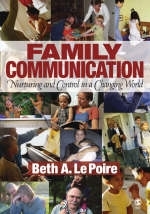
Family Communication
SAGE Publications Inc (Verlag)
978-1-4129-0406-3 (ISBN)
Family Communication: Nurturing and Control in a Changing World thoroughly reviews the traditional family communication theories of roles theory, family systems theory, and rules theory in an engaging, non-traditional way. This book uniquely organizes the study of family communication around the concepts of nurturing and control in all family relationships, across all family forms, and their relationships to psychological processes and communicative outcomes in families.
Key Features:
Looks at Family in All Forms: Traditional nuclear; non-traditional nuclear; bi-nuclear families; cohabitation, single-parent households; step-family and blended configurations; gay families; couples with no children; and extended families are all examined. While not all families fit neatly within any of the traditional definitions, this book articulates a sentiment that most students can resonate to—that all family forms include some form of nurturing and control.
Explores Sociological and Psychological Factors: Various forces such as governmental, religious, media influences, and social science research, cause us to assume most families are traditional and nuclear, using biological, legal, and sociological definitions. In addition to the sociological and psychological bases of developmental processes, the development of parental attachment is fully discussed, showing how nurturing and controlling communication processes encourage socio-emotional competence in children.
Explicates New Research Findings: A new family communication theory—Inconsistent Nurturing as Control Theory—explores the ways in which family members attempt to change the undesirable behaviors of a particular family member (e.g., substance abuser, eating disordered individual, gambler, depressed person, violent individual) through their use of nurturing as control.
Intended Audience:
Perfect for the introductory undergraduate course in Family Communication; as well as courses in Sociology, Social and Clinical Psychology, Educational Psychology, Family Counseling, Family Education, and Home Economics
Beth Le Poire (Ph.D., University of Arizona; M.A., University of Arizona; B. A., California State University, Stanislaus) is full professor in the department of communication at the University of California, Santa Barbara. She has 40 published works across communication in such journals as Human Communication Research and Communication Monographs. In family communication, her work looks specifically at parental and romantic attachment and the influence of partners on continued problematic behavior in the family (e.g., substance abuse). She has presented more than 70 conference presentations and has been the recipient of 14 top paper awards across national and international conventions. She has also been the recipient of the National Communication Association′s Golden Anniversary Monograph award. She is just completing her editorship of Communication Reports and serves on 8 editorial boards including Human Communication Research, Communication Monographs, Communication Quarterly, and Journal of Communication. She has taught family communication since 1995 to more than 1,200 students.
Introduction
1. Introduction: Families, Communication, and Family Communication
Families
Communication
Family Communication
Why Communication is Central to Families
Summary
Key Terms
Questions for Application
2. Family Forms in Our Changing Society
Introduction - The Family Context
Societal Influences on the Family Form
Family Forms
Summary
Key Terms
Questions for Application
3. Theoretical Approaches to Understanding Communication in the Family
Introduction of Theory
Roles Theory
Family Systems Theory
Rules Theory
Summary
Key Terms
Questions for Application
4. Forming the New Family Pairing - Two Become One
Social Psychological Bases of Attraction
Psycho-Analytic Bases of Attraction
Relational Stages of Development
Summary
Key Terms
Questions for Application
5. Communication in the Newly Formed Family - Adding Children
The Effects of Pregnancy on Communication
Addition of the Child and Changes in Communication
Communication in Sibling Relationships
Adding Children Through Remarriage: Communication in the Step-Parent-Step-Child Relationship
Summary
Key Terms
Questions for Application
6. Nurturing and Controlling Communication: Raising Socio-Emotionally and Intellectually Competent Children
Control - Providing Discipline and Guidance through Communication
Nurturing - Providing Support and Love
Summary
Key Terms
Questions for Applications
7. Nurturing Communication in Marital Relationships: Encouraging Closeness, Stability, and Satisfaction through Communication
Introduction
Maintaining Closeness in Marital Relationships
The Communication of Closeness in the Marital Relationship
Factors Related to Marital Satisfaction which May Affect Marital Communication
Summary
Key Terms
Questions for Application
8. Control in Marital Relationships and the Family
Introduction
The Nature of Conflict
Models of Conflict
Conflict Styles
Conflict Strategies (Interpersonal Influence Strategies)
The Nature of Violence
Summary
Key Terms
Questions for Application
9. Nurturing and Controlling Communication Surrounding Undesirable Behavior in the Family
Introduction
Undesirable Behavior in the Family
The Potential Role of Communication and Problematic Behavior in Families
Family Systems Theory
Coercion Theory
Inconsistent Nurturing as Control Theory
Key Terms
Questions for Application
10. Family Communication: Providing Nurturing and Control in a Changing World
Introduction - What We Have Learned
The Current Configuration of Families: Nurturing and Controlling Communication
Improving Family Communication
Summary
Key Terms
Questions for Application
| Erscheint lt. Verlag | 2.2.2006 |
|---|---|
| Verlagsort | Thousand Oaks |
| Sprache | englisch |
| Maße | 177 x 254 mm |
| Gewicht | 630 g |
| Themenwelt | Schulbuch / Wörterbuch ► Wörterbuch / Fremdsprachen |
| Geisteswissenschaften ► Sprach- / Literaturwissenschaft ► Sprachwissenschaft | |
| Sozialwissenschaften ► Kommunikation / Medien ► Kommunikationswissenschaft | |
| Sozialwissenschaften ► Soziologie ► Mikrosoziologie | |
| ISBN-10 | 1-4129-0406-4 / 1412904064 |
| ISBN-13 | 978-1-4129-0406-3 / 9781412904063 |
| Zustand | Neuware |
| Haben Sie eine Frage zum Produkt? |
aus dem Bereich


